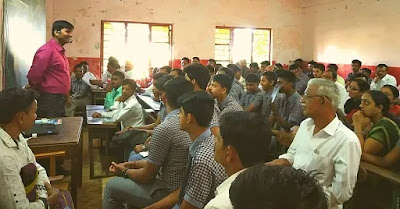When Dipesh Ranveer from Purna Taluka in Parbhani district, Maharashtra, attempted the Joint Engineering Examination (JEE) in April 2019 for the first time, he struggled to understand a few questions. This was not because of his inability to understand science, but a result of his poor English comprehension skills.
"When I first heard about the free online classes organised by the Path Pradarshak Foundation to prepare students for competitive exams like JEE, I signed up for it. Despite clearing the entrance exam to get into their classes, my self-confidence was very low. I had attempted the exam once after school, but couldn't clear it," says Dipesh, the son of a village school teacher and a housewife. To prepare for the JEE exam, Dipesh took the 2019/2020 academic year off studying in his village.
"Dipesh couldn't even comprehend a single English sentence and possessed an incredible inferiority complex about himself. Apart from conceptual understanding, a lot of these competitive exams require more than a working knowledge of English comprehension. He really struggled with the language. Nobody believed in him, but with determination and focus he cleared JEE and got into NIT-Raipur. He's the first one from his village to get into an NIT," says Robin Mandal, an IIT-Bombay alumni and co-founder of Path Pradarshak.
Coordinating with a local teacher, who owned a smartphone, Dipesh began attending these free online classes conducted over a YouTube channel called Grow Bharat, which has over 46,000 subscribers.
"I couldn't understand the questions very well when my preparations began because my English language skills were weak. When I reached out to Robin sir, he suggested that I work on questions that I understood first and then attempt to solve those that I didn't understand. Through a long process of trial and error, I began understanding the nature of these questions, what they meant and answering them became a lot easier over time. With hours of practice and immense motivation from my teachers at Path Pradarshak, I began understanding these questions a lot better," recalls Dipesh.
Inspiration and Challenges
It was during their stint together at Super 30, a programme teaching meritorious underprivileged students for free at their non-profit coaching centre every year, when they came to understand how students from such backgrounds could be helped. Of the four co-founders, three of them continue to teach in the Super 30 programme. "About two to three years back, some of my students who couldn't even frame a sentence in English, were getting into IIT-Delhi and IIT-Madras. When those things started to happen, that's when we thought our vision could be realised. Formally all four of us got together to take these free classes in 2019. However, we didn't think to register ourselves as a non-profit until the COVID-19 pandemic struck in 2020," says Robin. Despite their recent endeavours, the challenges of teaching these free classes online is verreal, particularly on the question of data consumption. There are occasions when students on the group cannot see the video because the internet bandwidth is too low.
How do they address this problem?
"Like we used to do with Super 30 students, we sometimes give them a Jio subscription worth Rs 1,000 for 3GB per day. You require at least 2 to 3 GB per day of data if you are totally dependent on online classes. To ensure more students from underprivileged backgrounds have better access to our lectures, merely sending recorded lectures isn't enough. Just giving them a Tablet or a 3GB Jio subscription is not enough either. We need to create a better learning ecosystem where the child resides, giving them tech support, working closely with their parents and getting the sarpanch of a village involved, who can facilitate the creation of a common learning centre where he resides," notes Robin. "Once our students join our Telegram Channel and subscribe to our YouTube channel, they have our personal contact number. We organise regular calls with these students to check on them and find out how far they are progressing in class. If we find these students to be sincere, earnest and are seen asking regular questions on relevant subjects, we provide them with a phone or a data plan, particularly for students living in remote corners of this country. Unfortunately, we haven't been able to really scale up these initiatives. So far, we have provided data subscriptions for 21 students from rural Maharashtra, and send them regular test papers to monitor their progress," says Sumit. These students largely attend their classes on smartphones. But Robin argues that this method poses a major challenge.The Tablet is not costly, but it provides a bigger screen, and we need to get more of this equipment out to our students to improve their learning experience. Usually, these students can't afford high volumes of data or they have to rely on their elder sibling or parent. Usually, the household has one functional smartphone, and they manage it on them. Since data is an issue, we hold classes in the mornings and evenings.
Source: https://ift.tt/3aMaUnx

